
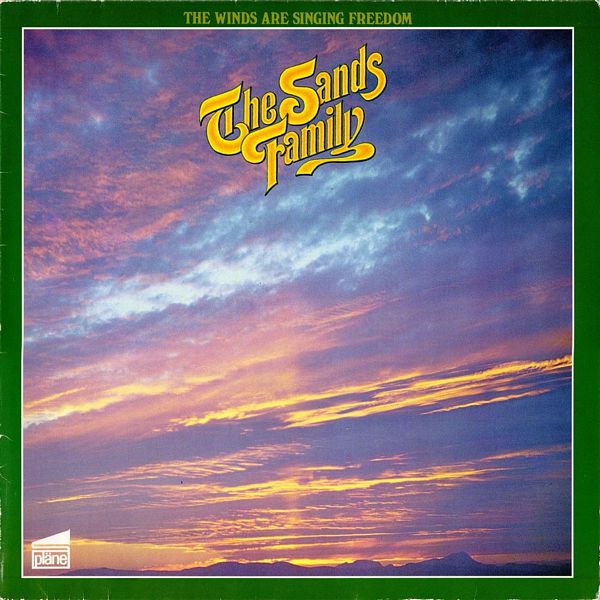 |
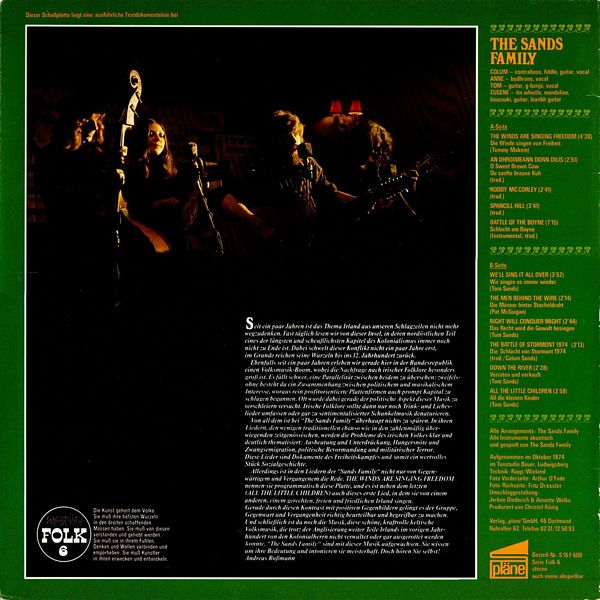
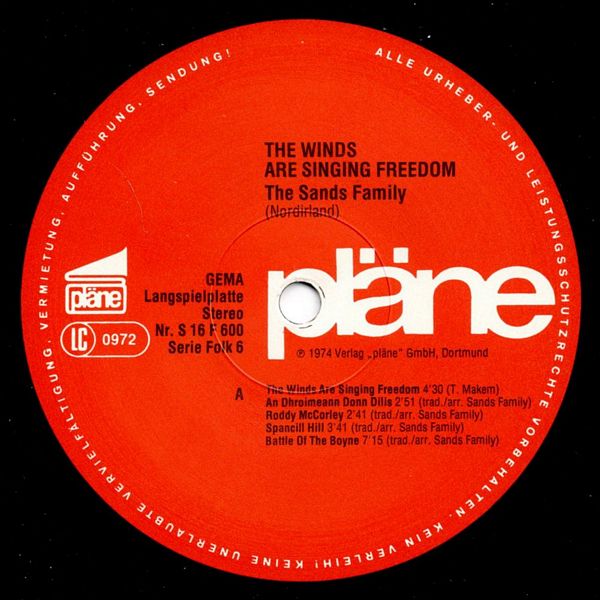
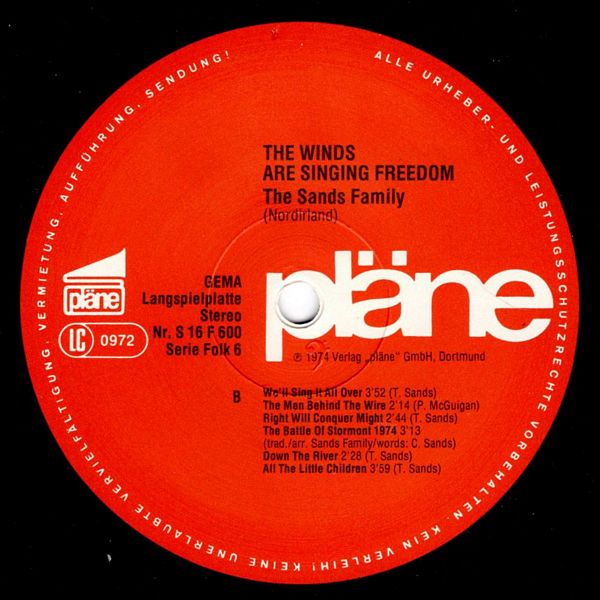 |
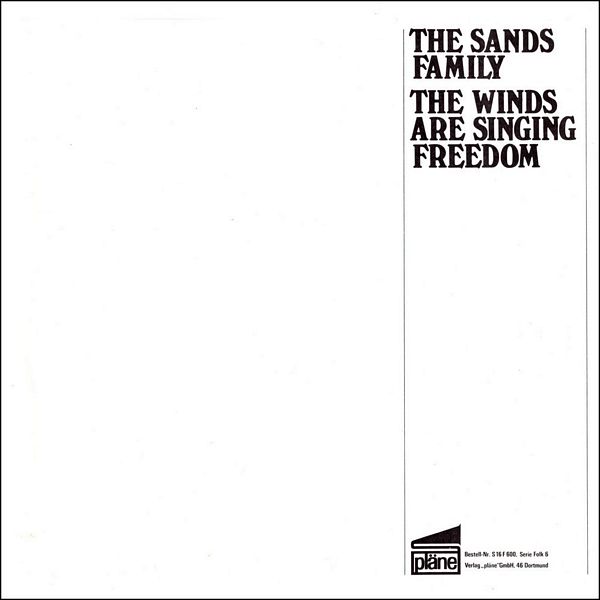
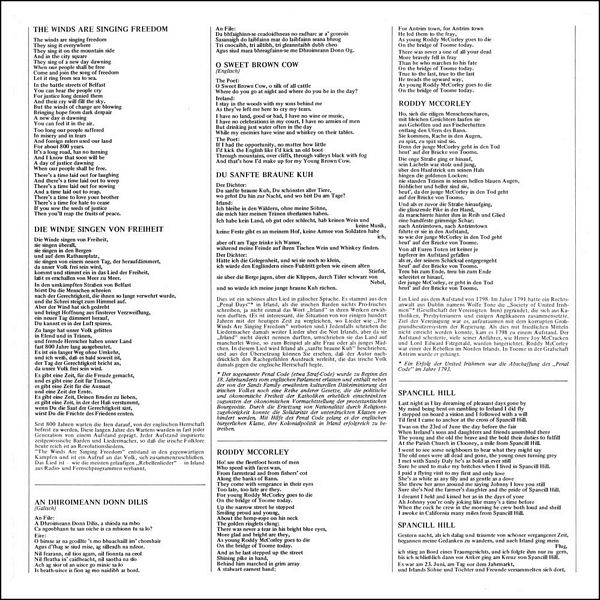
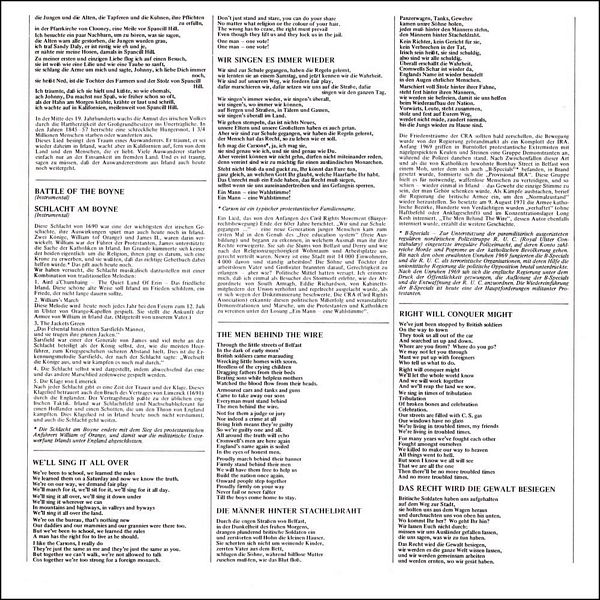
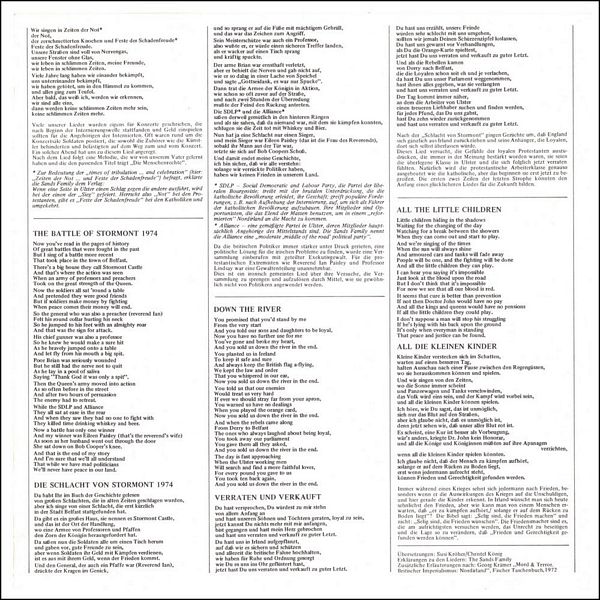 |
Sleeve Notes
For a few years, the topic of Ireland has become an indispensable part of our headlines. Almost daily we read about this island, in the northeastern part of which one of the longest and most hideous chapters of colonialism still has not come to an end. This conflict does not smolder a few years, basically its roots go back to the 12th century.
For a few years now, we have been experiencing a folk music boom here in Germany, where the demand for Irish folklore is particularly high. It is difficult to overlook a parallelism between the two: there is no doubt that there is a connection between political and musical interest, from which purely profit-oriented record companies began to capitalize promptly. Often the political aspect of this music was tried to disguise. Irish folklore should then only include drinking and love songs or even denature them to sentimentalized music.
Of all this, "The Sands Family" is not felt at all. In their songs, the few traditional as well as in the numerically vast contemporary, the problems of the Irish people are clearly and clearly addressed: exploitation and oppression, famine and forced emigration, political tutelage and military terror.
These songs are documents of the freedom struggle and thus a valuable piece of social history.
However, the songs of the "Sands Family" not only talk about the present and the past. THE WINDS ARE SINGING FREEDOM they programmatically call this record, and next to the last one (ALL THE LITTLE CHILDREN) is also this first song in which they sing about another, just, free and peaceful Ireland.
It is precisely through this contrast with positive counterparts that the group succeeds in making the present and the past correctly assessable and comprehensible.
And finally there is the music, this beautiful, powerful Celtic folk music, which despite the Anglicization of large parts of Ireland in the last century could not be managed or even eradicated by the colonial lords. "The Sands Family" grew up with this music. They know their meaning and intone it masterfully. But listen for yourself!
Andreas Roßmann (Rossmann)
Art belongs to the people.
It must have its deepest roots in the broad creative masses.
She must be understood and loved by them.
She must connect and elevate her in her feeling, thinking and willing.
She has to awaken and develop artists in them.
The Winds Are Singing Freedom — For 800 years, the Irish have been waiting to be freed from English rule. These long years of waiting were marked by an uprising in almost every generation. Every uprising inspired contemporary bards and songwriters, making Irish folklore rich in revolutionary songs today.
"The Winds Arc Singing Freedom" emerged in the current struggles and is an appeal to the people to unite. The song is — like most common "rebel songs" in Ireland banished from radio and television programs.
An DhroimeAnne Donn Dilis (O Sweet Brown Cow) — This is a beautiful old song in Gaelic language. It comes from the "Penal Days" * in Ireland, when the Irish bards did not write anything pro-Irish, not even mentioning the word "Ireland" in their works. (It's interesting to compare the situation a few hundred years ago with the days when songs like "The Winds Are Singing Freedom" are bAnned.) Anyway, the songwriters continued to write songs about the plight of Ireland, but as they said, "Ireland "Could not call directly, they described the country in many ways, such as an old woman or a young girl. In this song, Ireland is described as a "gentle brown cow," and from the translation you can see that the author expresses emphatically the avenging feelings that the Irish people at that time hated against English rule.
* The so-called Penal Code was passed by the English Parliament in the early eighteenth century and, in addition to the cultural discrimination against the Irish people mentioned by the Sands Family, contains a number of other laws that significantly increase the political and economic freedom of Catholics limited in favor of the economic supremacy of the Protestant bourgeoisie. The substitution of nationality for religious affiliation prevented the solidarity of the oppressed classes. With the help of the Penal Code, the English bourgeois class succeeded in successfully pursuing their colonial policy in Ireland.
Roddy McCorley — A song from the 1798 uprising. In 1791, a Dublin lawyer named Wolfe Tone founded the Society of United Irishmen*, composed of Catholics, Presbyterians, and some Anglicans. The aim of the association was to clean up the government's corrupt landlord system. When this could not be achieved by peaceful means, it came 1798 to a rebellion. The uprising failed, many of its leaders, such as Henry Joy McCracken and Lord Edward Fitzgerald, were executed. Roddy McCorley was one of the rebels in the north of Ireland. He was hanged in Toome, County Antrim.
* A success of the United Irishmen was the abolition of the "Penal Code" in 1793.
Spancill Hill — In the middle of the 19th century, the poverty of the Irish people grew unbearable through the hard-heartedness of the landlords. In the years 1845-57 there was a terrible famine, 1 3/4 million people died or emigrated.
This song sings the dream of an emigrant. He dreams he's back home in Ireland, but wakes up in California, far from the land and people he loves. Many emigrants just died from loneliness in a foreign country. And it is sad to say that Ireland's emigration continues today
Battle of The Boyne (Instrumental) — * The Battle of the Boyne ended with the victory of the Protestant leader William of Orange, ending the military subjugation of Ireland to England.
We'll Sing It All Over — A song that tells of the beginnings of the Civil Rights Movement in the late 1960s. "We went to school …" — a new generation of young people first came into the free education system and began to realize the extent to which they were denied their rights Slums of Belfast and Derry and how religiously housing, and jobs were unfairly distributed Newry is a city of 14,000, 4,000 of them are permanently unemployed! The sons and daughters of the unemployed fathers and grandfathers were eager to obtain justice, but how Political resources had failed, and I remember once, as a visitor to the Stormont, how the South Armagh MP, Eddie Richardson, was mocked by members of the Union's cabinet and laughed at when he complained of discrimination CRA (Civil Rights Association) recognized this political failure and organized demonstrations and marches to the Protestants and to unite Catholics under the slogan "One Man One Elective".
* Carson is a typical Protestant surname.
The Men Are the Wire — The peace dream of the CRA was soon to shatter, the movement was branded by the government as a conspiracy of the IRA. At the beginning of 1969, in Burntollet, Protestant extremists attacked a group of demonstrators with nails spiked with clubs and stones while the police stood by. After incidents of this kind and when the Catholic-inhabited Bombay Street in Belfast was set on fire by a mob, including "B-Specials" *, the "Provisional IRA" formed. This group felt it was necessary to defend unarmed humans, and so it seemed — once again in Ireland the rifle was the only voice that would be heard. When fighting broke out, the government called the British army to restore "normalcy." Thus, on August 9, 1971, the army occupied Catholic districts, hundreds of suspects were "arrested" (without a warrant or indictment) and interned in the Long Kesh concentration camp. The Men Behind the Wire, whose author was also interned, tells the story.
* B Specials — In the context of the paramilitary regular police force R. U. C. (Royal Ulster Constabulary), an irregular police force has been set up, with numerous killings and pogroms on the Catholic population. Until the abovementioned riots in 1969, the B-Specials and the R.U.C. acted as terrorist organizations, with the help of which the Unionist government brutally repressed the political opposition. After the turmoil of 1969, under pressure from the public, the British government was forced to order the dissolution of the B Specials and the disarmament of the R.U.C. The reintroduction of the B Specials is today one of the main demands of militant Protestants.
Right Will Conquer Might — Many of our songs were written especially for concerts that took place after the beginning of the wave of internment and were to collect money for the relatives of the internees. There were often soldiers stationed around the concert halls, obstructing and harassing both listeners and artists on their way to and from the concert. Such an evening has inspired us to this song.
After the song follows a melody that we learned from our father and bears the appropriate title "Human Rights".
* Asked about the meaning of the "times of tribulation … and celebration" (here: "times of need … and festivals of gloating"), the Sands Family told the publisher: When one side in Ulster hits the other, one of them wins the "victory". If there is "emergency" among the Protestants, there are "feasts of glee" among the Catholics and vice versa.
The Battle of Stormont 1974 — As British politicians came under increasing pressure to find a political solution to Irish problems, a meeting was convened with shared executive power. For the Protestant extremists like Reverend Ian Paisley and Professor Lindsay, a separation of powers was unacceptable.
This is an ironic song about their attempts to blow up and dissolve the congregation by means that are not usually used by politicians.
* SD LP — Social Democratic and Labor Party, the party of the liberal bourgeoisie; is doing business with the brutal oppression suffered by the Catholic population; picks up popular demands, e.g. For example, after the abolition of internment, to build up as a leader of the Catholic population. Its members are opportunists who use the misery of the masses to gain power in a "reformed" Northern Ireland.
* Alliance — a moderate party in Ulster whose members are mainly middle-class members. The Sands Family calls the Alliance a "moderate, middle-of-the-road political party".
Down the River — After the "Battle of Stormont" there were rumors that England would withdraw completely from Ireland and leave its followers, the loyal ones, to their own devices.
This song seeks to express the feelings of the loyal Protestants, who have always been encouraged in the belief that they are the superior class in Ulster and therefore feel betrayed now. Of course, the Protestant working class is exploited as well as the Catholic, but they are only now beginning to understand. The first two lines of the last verse could be the beginning of a happier song for the future.
All the Little Children — Always during a war, everyone longs for peace, especially when he recognizes the effects of the war on the innocent, and especially the children. Today, in Ireland, one desperately wishes for peace, but how can one expect a human being to "stop fighting as long as he lies down on his back"? The Bible says, "Blessed are those who make peace," not "Blessed are they who desire peace." It is the peacemakers who will most sincerely seek to eliminate injustice and change the situation so that "peace and justice can be found".
Translations: Susi Kröher / Christcl König
Explanations to the songs: The Sands Family
Additional explanations to: Georg Krämer "Mord & Terror.
British Imperialism: Northern Ireland ", Fischer Paperback, 1972
The sleeve notes to this album are in German, above is via google translate.